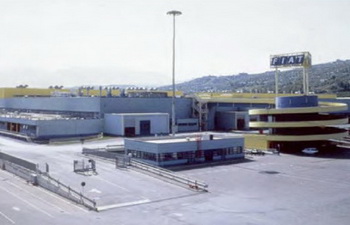 |
|
There was
no Christmas present for the workers at Fiat's threatened
Termini Imerese factory in Sicily in Sergio Marchionne's new
two-year industrial plan despite him targeting a 50 percent
hike in production for Italy. |
|
|
|
There was no
Christmas present for the workers at Fiat’s threatened
Termini Imerese factory in Sicily in Sergio Marchionne’s new
two-year industrial plan, despite him targeting a 50 percent
hike in production for Italy.
Marchionne
emphasised in the presentation that the production landscape
had to change, with the six plants in Italy currently
producing a combined 650,000 vehicles annually while
employing 22,000 staff. He said this contrasted
unfavourably with the Tychy plant in Poland, which turns out
600,000 vehicles with 6,100 staff, and the Betim factory in
Brazil, which builds 730,000 vehicles and has 9,400 staff.
Marchionne was
also categorical that the century-long close link between
Fiat Group and the state, where the national carmaker is
seen as much more than just a commercial business – and is
rather a vibrant symbol of the country with an important
role in the social fabric of Italian life – no longer
applies. It severs the bond
that the Agnelli family built. “Bearing the burden of the
social problems at Termini is not Fiat’s responsibility,”
Marchionne bluntly told the government representatives and
unions assembled in Rome yesterday, adding: “It wasn’t
before and it isn’t now.” The signs are that the Italian
government, which has been pushing Fiat hard to raise
Italian production levels, is prepared to accept the closure
of Termini Imerese in exchange for this, although industry
minister Claudio Scajola drew out lines when he recently
said that Fiat would be “crazy” to close the Sicilian plant.
“We announced
already in June that the plant in Sicily will cease
producing cars in 2011,” Marchionne said. "Let me be clear:
the quality of the work and the commitment of the people
there is not in question. There were other considerations.
The industrial activity at Termini Imerese was always
severely hindered by the plant’s intrinsic competitive
disadvantages. There is practically no local supplier base.
The logistics costs are enormous. Producing a car at Termini
Imerese, as you know, costs as much as €1,000 more. There
are structural issues which represent a continuous drain on
resources. Over the past few months we have sought,
internally, an industrial alternative for this site.
However, we always encounter the same obstacle: a cost
structure which would render any of Fiat Group's products
unfeasible. We have to be extremely honest on that point.
Any company anywhere in the world - Fiat included - has the
right and even the duty to make rational industrial choices.
The right and the duty to make decisions autonomously,
focusing first and foremost on what is best for the company,
for its competitiveness and for its future development. Fiat
has always exercised this freedom in a responsible manner,
as long as it didn’t mean compromising its own future. We
have borne the operating losses from the plant in Termini
Imerese for many years. The broader context was completely
different, however, and it enabled us to absorb the enormous
costs associated with operating this plant. Today we can no
longer afford to do so. Globally, the conditions of the
economy and the market have completely changed. Competition
is putting companies to a severe test, often forcing them to
make difficult choices.
“Here we also
need to be honest: bearing the burden of the social problems
at Termini is not Fiat's responsibility. It wasn’t before
and it isn’t now. It is a burden which rests on the
shoulders of the entire system. When the markets react in
such an extreme manner – as in the current crisis – the
response has to be collective. The model for social
development which we have embraced – in Italy as in the rest
of Europe – means exactly that. It means guaranteeing
protection when markets undergo structural changes. It means
that every citizen should be able to count on a security net
when markets react in such a brutal manner. We are perfectly
aware of the social consequences that a plant closure would
have. We fully understand how the workers at Termini Imerese
feel. This is an issue which requires the energies of the
entire system. We are prepared to do our part, if everyone
else does theirs. We stand fully ready to help and offer
support for any proposals to convert the site which may come
from the Region of Sicily, other public institutions or
private groups. We stand ready to collaborate in securing a
solution which will continue to provide employment for the
workers at Termini once the production of automobiles has
stopped. We even stand ready to make the plant available for
a project which will provide job security for our
employees.”
|